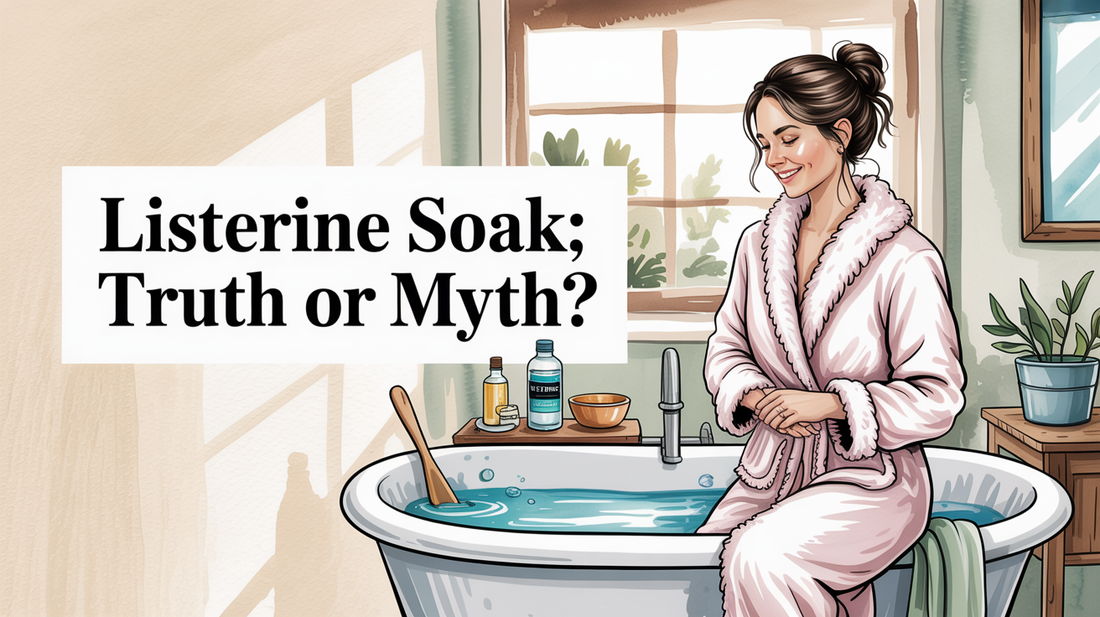Listerine Foot Soak: Does This Viral Hack Really Work?
listerine foot soak, foot soak remedies, diy foot soak — Many people are searching for effective ways to pamper their feet, and the viral trend of Listerine foot soaks has caught the attention of many. This post will explore the claims of this popular hack, how to test it at home, and suggest better alternatives for ongoing foot care. Get ready to take action tonight!
What a Listerine Foot Soak Claims to Do 🧭
Listerine foot soaks have gained immense popularity on social media, as users share their experiences and the potential benefits for foot health. Typically, this hack involves mixing Listerine mouthwash with warm water and soaking feet for about 10-15 minutes. Advocates claim that it may help to soften and remove dead skin, as well as alleviate foot odor.
Supporters also suggest that the ingredients in Listerine, like thymol and eucalyptol, have antifungal properties, making them beneficial for conditions like athlete's foot. The idea is that it can naturally exfoliate feet without the need for harsh scrubbing, providing an inexpensive alternative to professional pedicures.
- Softens and helps remove dead skin and calluses.
- May assist with foot odor and athlete's foot.
- Potential antifungal properties from key ingredients.
- Offers a natural exfoliation method without harsh abrasives.
- Marketed as a budget-friendly alternative to pedicures.
Try It Tonight: Calm, Fresh Feet ✨
- Wash feet with warm water and mild cleanser; dry thoroughly between toes.
- Apply a small amount of Kissable Feet where needed; massage until absorbed.
- Let skin breathe; slip on breathable socks if desired. Patch-test first if you’re new to this foot cream.
Testing the Viral Hack at Home ✨
When it comes to testing Listerine foot soaks at home, it's essential to have realistic expectations and a proper approach. Users have reported varying results, and while some may see positive effects, scientific evidence supporting these claims is limited. For effective soaking, mix equal parts of Listerine and warm water in a basin large enough for both feet.
After soaking your feet for 10-15 minutes, gently rub or use a pumice stone to help with any softened skin. Many users might experience temporary skin softening, but the dramatic peeling shown in viral videos is often exaggerated. Also, keep in mind that the alcohol content in Listerine could potentially cause dryness or irritation, especially for those with sensitive skin.
- Combine equal parts Listerine and warm water in a suitable basin.
- Soak feet for 10-15 minutes, then gently exfoliate the softened skin.
- Results may vary; expect temporary softening rather than drastic peeling.
- Alcohol content may lead to dryness or irritation for some users.
- Antibacterial effects might be short-lived compared to specialized antifungal treatments.
Why We Recommend a Gentle Helper 🌿
Kissable Feet is formulated for quick absorption and a soothing experience, with no stinging sensation. This nurse-crafted blend includes tea tree, coconut, and calendula, making it easy to incorporate into your nightly routine.
- Fast-absorbing comfort with a non-greasy finish.
- Gentle feel suitable for sensitive, overworked feet.
- Fresh, bedtime-friendly scent.
Better Alternatives for Long-Term Results 🔍
Professional podiatrists and dermatologists suggest more effective and safer alternatives for long-term foot care than Listerine soaks. For instance, urea-based creams with a concentration of 10-40% are clinically proven to soften calluses and dead skin efficiently. Incorporating a pumice stone or foot file after bathing can help maintain soft skin.
Moreover, antifungal creams or powders are specifically designed for athlete's foot and fungal infections, while regular professional pedicures can address severe calluses and other persistent foot issues. Daily moisturizing with foot-specific creams containing ingredients like salicylic acid or lactic acid can also support gentle exfoliation.
- Urea-based creams (10-40% concentration) effectively soften calluses.
- Regular use of pumice stones or foot files is recommended.
- Antifungal creams or powders are targeted for athlete's foot.
- Professional treatments are beneficial for severe issues.
- Daily moisturizing with specialized creams supports gentle care.

